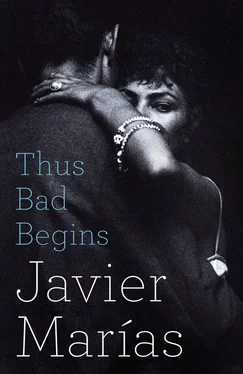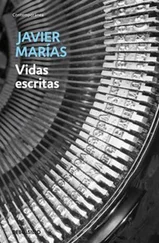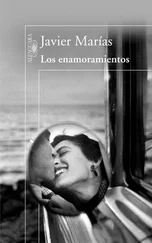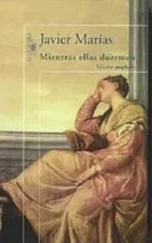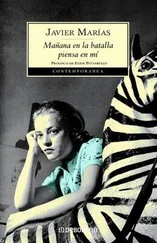Professor Rico was quite a lot younger than Muriel and had not yet reached the age when nothing can be healed, although it was fast approaching. Even though he was getting on for forty, he was still childishly and verbally lewd and opinionated and arrogant, and therein lay much of his wit and charm (for those who could see them, because some people couldn’t stand him), and these qualities brought him quite a few conquests, theoretical or hypothetical ones at least, as I’ve explained. He might have been the sort to engage in the kind of masculine calculations I mentioned before (‘How many women etc. etc. …’), except that he would have made a mental notch on his gun as soon as he saw that a seduction was a sure thing, as soon as he was certain that, as he had occasionally declared with touching glee — or, rather, complacency — ‘that woman could be mine at the click of my fingers, it’s obvious, indubitable’, which was his reason for not always feeling it necessary to allow the seduction to reach its inevitable conclusion or ‘to finish the job’, although this was more Van Vechten’s way of putting it than Rico’s.
No, it seemed to me that almost no one around me had lost any of their eager desires — perhaps it was the unexpected, agitated nature of the times — least of all the celebrated paediatrician, the oldest member of the group — he was about ten years older than Muriel, nearly twenty years older than Beatriz or Rico and almost forty years older than me. And although, as I said, he looked more like a fifty-year-old and was still strong and agile, it still seemed incomprehensible and incongruous that I should invite him to go out with me and my friends. However, it proved easy enough to persuade him, he certainly didn’t play hard to get, he didn’t resist or turn up his nose; he was a pushover, fertile ground. Such was his keenness, such was his sorrow at missing out on that easy-going, permissive age, such was his desperation when he imagined what was slipping past him because of a mere incompatibility of dates (which is something that, as long as we live, we still think can be remedied, if not turned on its head), he was over the moon when I invited him to go with me, first, to bars and, later, to discotheques and live-music venues. The latter were full of people of various ages, where you could talk despite the decibels and even sit down now and then, and so he wouldn’t feel so very out of place, especially since some of those venues were old haunts of his, which had come back into fashion with a new, enthusiastic clientele, generally ignorant of the past and utterly different from the clientele who had frequented them during their various antediluvian phases. This was the case, I think, with El Sol in Calle Jardines or, later on, the Cock in Calle de la Reina, or, of course, Bar Chicote, in Gran Vía, which, if I’m not mistaken, had been open since before the Civil War and is, inevitably, mentioned by Hemingway in some of his articles and his more touristy novels. Afterwards, during the post-war years, it had first been taken over by discreet, fairly classy whores, by bullfighters, actors, singers, footballers, actresses and, later, by high-ranking civil servants in Franco’s government, businessmen with close links to the regime and even the occasional party-mad minister; the first group were eager to meet the second group, and the second group to meet the first, and the club provided the ideal meeting place. I wondered if Van Vechten had been a regular during those seemingly endless years, when he was officially on good terms with the victors (well, in the 1940s he was one of them, something people always forgot) and benefited from his contacts; if he had joined the rich and powerful in partaking of Bar Chicote’s famous cocktails and occasionally glanced over at the stools where any women on their own used to sit, leaning on the bar, carefully seated in half-profile (so as not to offer only a monotonous view of female posteriors) and pretending to chat with each other, until they were invited to join a group at a table. Around 1980, you would still see the occasional elderly, absent-minded woman, who, perhaps seeing the place so lively again after a long period of decay, again sat down on her bar stool of yesteryear, thinking that the good old days had somehow miraculously been restored and the clocks turned back. In fact, one of those veteran ladies once came over to our table, where she stood staring at Van Vechten, then said very sweetly:
‘I know you, don’t I? I remember those blue, blue eyes and that blond hair. You’ve hardly changed at all. Not a grey hair in sight and not a hint of a bald patch.’
However, Van Vechten, who remained seated and adopted a look of genuine surprise and doubtless genuine malice, responded:
‘No, Señora. You must be confusing me with my father, whom I greatly resemble. As you can see, the people who come here now’ — he paused heartlessly, looking round at me and my group and smugly, arrogantly including himself — ‘are all rather young.’
Dr Van Vechten was anything but inhibited, so much so that my initial fears proved not only unfounded, but ridiculous, namely, that he would find my friendly suggestion that he join me now and then on my nocturnal sorties suspicious and inappropriate. Muriel knew him well, which is why he’d had no qualms about setting me that task, sure that Van Vechten would never judge anything to be gratuitous or unmerited if it brought with it the promise of amusement and pleasure. I had put this down at first to a misjudgement on the part of my boss, to his often unworldly sense of reality. This was not entirely true, however, for I soon realized that he missed almost nothing of what really mattered about people or situations; that beneath his abstracted, even self-absorbed appearance, he noticed and saw far more than he seemed to. Whenever I failed in my attempts to decipher his thoughts, I assumed he must be making plans in his head, imagining future shots and camera moves, and this may have been true, but he still never lost track of the story he was telling or that was being told to him, or of the idea that was troubling him. He had a very distinctive style, but he wasn’t a mere stylist, still less an aesthete, either in his films or in life. He liked to pretend that he knew very little about what was going on around him and preferred to say nothing about what he did notice, but I think he noticed a lot and knew about almost everything.
Van Vechten did indeed have very blue eyes and the kind of blond hair which is still memorable in a country where such hair colour is much more common than people think and admit, albeit less pure and more mixed: here, pale-coloured eyes tend to be greyish or green or reminiscent of various liqueurs or dark blue like Muriel’s one seeing eye, and hair is rarely that insipid or Nordic blond. He really did look like a foreigner, as if his numerous ancestors in Arévalo must have gone more and more frequently to Holland in search of a bride. That’s why he was so instantly recognizable, the veteran whore was probably quite right, although he didn’t at all strike me as a classic whoremonger. His eyes had a bright, youthful glint to them — indeed, they were southern European in their intensity, an intensity that could quickly become obscene and offensive; he had regular, indeed, attractive features (he must have been handsome when young), dazzling and healthy-looking teeth — large, rectangular incisors — a very strong jaw and a rather square face; the only things that slightly spoiled his looks were his rather pointed nose and ears, like an elf’s ears, and his somewhat protruding chin, though not quite a witch’s chin. I once remarked to Muriel that Van Vechten resembled a minor, almost incidental American actor, who appeared in hundreds of films but whose name would be unknown to most cinema-goers: ‘Robert J. Wilke,’ I said with youthful, point-scoring pedantry, and he nodded and replied instantly: ‘Yes, one of the three gunmen who spend almost the whole of High Noon waiting for the train to arrive. But you’re right, well spotted. And oddly enough, I think that as well as appearing in innumerable Westerns, he also appeared on more than one occasion in a doctor’s white coat.’ That is how I had seen Van Vechten when he was screwing Beatriz at the Sanctuary of Darmstadt, both of them standing up and both fully clothed. But Muriel didn’t know that I had that image of the Doctor in my head, his white coat unbuttoned.
Читать дальше
